An Overview for those not on Twitter + a Top 10 List, enjoy
On of my favorite lessons from one of my #IUHESA master’s courses was the concept of “enacted” versus “espoused” values. Organizations may tell us one thing they value, but then their policies, practices, and budget decisions may go directly against that one thing.
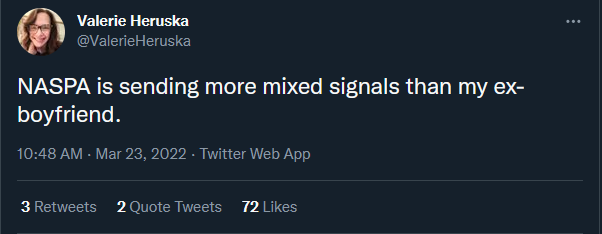
On March 23rd at the 2022 NASPA Convention, they introduced a 64-page report titled Charting the Future of Student Affairs. The highlights (featured in the Chronicle and Inside Higher Ed) include:
- only 60% of current Student Affairs professionals (SAPros) plan to stay in field beyond five years (tho, to be honest, many folks already leave after 5 years due to lack of upward mobility in SA)
- same amount agree that “they work at an institution with a welcoming and inclusive environment that values social justice, equity, diversity and inclusion.”
- 60% believe their colleagues leave the field because of hidden job responsibilities that are not discussed up front.
- Why do people leave? 84% said stress and 88% thought it was due to low salaries.
You know what will solve these problems?
“Student Affairs Educator Certifications”.
…Are you fucking kidding me??? (oh, for folks clutching their pearls at the swearing, it’s fine. I actually have a “Certification in 4-Letter Words” from the School of Hard Knocks, totally valid, you see, and it only cost me 8 ACEs).
What is the NA$PA Student Affairs Certifications Program?
Well first off, at the bottom of their website under “What Student Affairs Professionals are Saying” it lists 5 total people endorsing the program, all whom are Vice President of Student Affairs (VPSA) or similar and one faculty member.
So off the bat, we immediately know who this is for and who it is not, and which voices were in the room. Weird to not have more faculty or the people this program targets, mid-level pros…
Overall, this Certification:
- Is for Mid-Level Educators – Only for folks with master’s degree and 5 years experience (and is this post-grad or any exp?? Because I worked 5 years in nonprofit administration, including being a director, and lots of bias in this field against folks with non-SA work exp b/c god forbid deans of students understand transferable skills) or for folks with an associate’s or bachelor’s degree with a vague requirement of ‘more extensive work experience in the field’.
- Cost is not yet finalized, but est $375 for initial general certification.
- There will be specialty certifications at added costs provided by the 6 professional org partners: NACA, ACUHO-I, NIRSA, ACUI, AFA, ASCA.
- It is a quantitative assessment. Ya know, the thing most people agree is an inadequate form of assessing learning and perpetuates oppression, which is why most Student Affairs grad (SAgrad) programs don’t require the GRE anymore…
- You must take the assessment every 5 years to maintain certification + Continuing Education (CE). So, mo’ money, zero problems for NA$PA & Friends (aka the Higher Education Consortium for Student Affairs Certification that was created by NASPA and its 6 partner orgs, and is a new 501(c)3 meant to manage the program).
So, what is the curriculum for this program? We don’t have any idea, actually. And considering that NASPA and all of the associated pro orgs have received justifiable criticism over the years around their critical thinking of and commitment to social justice, you can understand why most folks are suspicious of what this content will look like for a program that launches this spring.
Wait, so why does this certifications program even exist? Well, the NA$PA & Friends website does list a benefits page. It is truly amazing that this group of leaders has managed to acquire a TARDIS or walked through some stones in Scotland to travel 10 years into the future. You see, they list all these benefits but without a curriculum, assessment, or outcomes data…If this was an academic paper, their ‘Limitations’ section would be the longest section. [see a related great tweet by @cjvenable]
Okay, Niki, you’re a known Student Affairs Killjoy…is this program really that big of a deal?
Glad you asked! Yes, it is. And it is important that we denounce it now before it picks up steam and irrevocably affects the field as VPSA (not all of them!! Many have already denounced this!) lemmings hop onto this fruitless endeavor.
Top 10 Reasons Why the NA$PA Certifications Program is B.A.D*. for the Student Affairs Profession
*(Bogus, Aimless, and Dangerous)
1.) This will CREATE pay disparity, not raise wages as promised.
NA$PA & Friends promises that a benefit of this unaccredited program is that it can support advancement. Oh, that is cute. So you’re telling me that the entry-level salaries of $35k to $40k are just because they don’t have a credential (this is not a lot of money, read my guide on how to live on this salary)? Really. Huh. Fascinating. You know what this really means. This program will only give VPSAs and deans rationale to pay people less.
Here is what will happen:
Mid-level staff member: Hello, I am excellent at my job, have 5+ years job experience and a master’s degree. I only make a pittance of $42k and request a raise.”
VPSA finishes chewing their avocado toast and then takes a sip of their $7 latte: “Oh! Oh what an interesting request there, my dear pleb – I mean, my dear colleague. ALAS, you have but a mere master’s degree but are not credentialed…my hands are tied, you see. I just cannot rationalize a salary raise.”
Mid-Level staff member: “Okay. Can I have the $400 to get credentialed and time made in my schedule to study for this and complete this without having to work more than 40 hours per week?”
VPSA throws their head back in laughter, raising their arm at the time and accidentally splashing their latte on their colleague: “I wish that I could, truly. It’s just with dwindling enrollment, our division is facing budget cuts, and we are cutting professional development for everyone below the director level.” VPSA looks and sees the mess on their colleague’s shirt. “You know, you really should dress more professionally and not wear stained clothing.”
Mid-Level staff member: *goes to job search* *becomes a SA expat*
2. This will reinforce systems of oppression
Have we not as a field of educators decided that quantitative testing is not a viable measurement of knowledge??? Multiple SAgrad programs, even the top ranked ones, have ended the GRE requirement for applicants. There are mountains of research on how standardized tests reinforce whiteness and every other majority identity out there.
Beyond the fact that a quantitative test is a TERRIBLE way to decide who is a skilled student affairs professional, I predict the following:
- Leaders in student affairs already overwhelmingly represent majority identities (white, male, from middle- or upper-class backgrounds, able-bodied, cishet, etc). This isn’t an accident. Minoritized people are excluded frequently from promotion opportunities. This program just gives VPSAs a valid excuse not to pay or promote people.
- Individuals from lower-income backgrounds, people who work at schools with restricted pro devo dollars, minoritized professionals (particularly folks of color) already overburdened at work with no extra time for this, people who are busy being caretakers for family, disabled folks, and others will have less access to this certifications program. They will miss out on hiring + promotion opportunities, further marginalizing them.
- An increase in the amount of white professionals, particularly white male professionals, in director roles and beyond if this certifications program is actually seriously used (I know what you are thinking – could it possibly get higher as it is?? Where there is whiteness, there is a way, so yes).
- If DEI (diversity, equity, & inclusion) or social justice certifications are created, they will absolutely be weaponized by majority-identity people to claim innocence when they are rightfully accused or perpetuating a specific ‘ism.

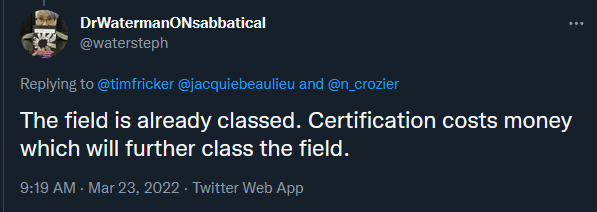
3. The “Other professions require credentialing!” argument is moot.
First off, there’s been a debate on ‘Is student affairs a profession?’ for many years. Those who say it is not cite that there is no licensure required (as with law, medicine, k-12 education, social work, etc) nor required CEUs (continuing education units).
Student affairs does not require a license. Teachers must take the Praxis exam to gain licensure, and that includes a general on writing, reading, and math and then an exam on the subject(s) they will be teaching on – to ensure teachers are qualified to teach others. Lawyers take the bar exam and that is focused on understanding of the law and ability to apply it. Again, makes sense. Medicine, same thing, tons of multiple choice questions on diagnosing disease and more. These professionals must be licensed in order to work with clients/patients. AND as @kevinforch said, CEUs for teachers are often built into contracts, contracts that are prepared with the assistance of unions, and said unions that argue for fair wages and job conditions. SA has no similar protective factors.
Student affairs includes multiple functional areas and there is even disagreement on who all is included in SA (plenty of advisors identify as Academic Affairs and not Student Affairs, but not all). Do you really think a multiple choice test is going to be able to include the many diverse areas of student affairs and different theoretical frameworks? There is no comparison from SA to law or medicine or social work when it comes to licensure.
Listen folks, I KNOW. So many of you, VPSAs especially, are desperate to show faculty that we are a real profession and thirst for their validation. But this isn’t the way.
4. We already have the CAS standards
I know the CAS standards are only a folk tale taught in graduate school, of this mythical way that student affairs professionals and departments can assess their skills and performance. But why not use these? Or are there several someones at NA$PA & Friends trying to create work for themselves so they have job security in this pandemic world? And/or perhaps to manage the income loss from covid and university budget cuts to pro devo for conferences and pro org memberships?
5. This was developed in a vacuum
Mind you, I don’t know who was all involved. Curiously, no names are listed of individuals. What I do know is multiple faculty and program directors of SAgrad programs shared on Twitter that they (a) never heard of this program before now, (b) had no say, and (c) have very real concerns (just one of many example tweets). Don’t get me wrong, I know there are faculty who were included and love this idea, but it is concerning that NA$PA didn’t choose to loop in SAgrad programs.
Of course, they do say on the NA$PA website that the following were involved: “A task force of student affairs educators, graduate faculty, and professional association representatives and staff were appointed by participating associations.” I’m just wondering…any graduate students, entry-level, or mid-level folks involved? I know that NA$PA is a membership organization and doesn’t have to include non-members in its programs, but considering it is literally trying to change the field…
6. NA$PA serves one group, and it’s not actually your average student affairs professional
It is generally considered that NASPA hosts more SSAOs (Senior Student Affairs Professionals) than ACPA (only comparing the two as they are both the only general SA pro orgs we have). NASPA has two main levels of membership – individual professionals and faculty ($75 for pros at member institutions and $242 for pros at non-member schools ) and institutional (which can range from $340-$2,034 annually).
As you can imagine, NASPA (and ACPA but to a different level) have a model that prioritizes SSAOs/VPSAs. If these decision-makers purchase an institutional membership, then all their staff will likely become individual members and also attend the regional and annual conferences.
So it is no surprise that, as reported by Forbes, NASPA has joined CUPA-HR and other higher ed pro orgs in a February 8, 2022 letter to President Biden’s Department of Labor to not raise the exempt salary threshold of $35,568 to $50,440. Oh, apologies – as NASPA clarified recently in a press release, they are merely asking for DOL to engage with “stakeholders” prior to a decision.
Uh huh, NOPE. This is the same thing SSAOs and Board of Trustees do when students demand action on a social justice issue – “oh let’s form a committee” or anything to delay until those students graduate. In other words, delay until Biden is out.
If NASPA actually wanted to support student affairs professionals they would support the exempt salary threshold increase.
- Then universities can still pay people less, but they are limited to 40 hours weekly or paid for overtime labor.
- Or, universities pay people more [a novel concept!].
Either way, this would help address burnout.
But golly, then SSAOs wouldn’t be able to squeeze every bit of free labor from entry and mid-level professionals forced to work more than 40 hours weekly.
Plus, now the SSAOs/VPSAs who serve on NASPA leadership can and may do their due diligence to keep their organization financially viable while directing their campus funds to this initiative. It’s like money laundering but legal and no ties to the mob (that we know of…) (this is a joke, pls don’t threaten to sue me like a certain 3-lettered academic did in 2019 when she disliked my accurate reporting, I don’t get paid enough lol).
7. What concepts will NA$PA & Friends be teaching?
Student affairs has and still does perpetuate white supremacy, ableism, classism, gender bias, and so many other areas of oppression. There is still a lot of messed up content in our graduate programs, literature, and within our student affairs divisions. Sure, we’ve been making strides…but forgive me if I am not inspired to trust NASPA of all orgs (and their named friends) in creating content that is critical and advances justice.
Hey, who knows? Maybe they will pay brilliant scholars tons of money to put together quality content. But since no curriculum is revealed, I make no assumptions that concepts infused with social justice will make its way onto that cute ‘lil $375 quantitative exam.
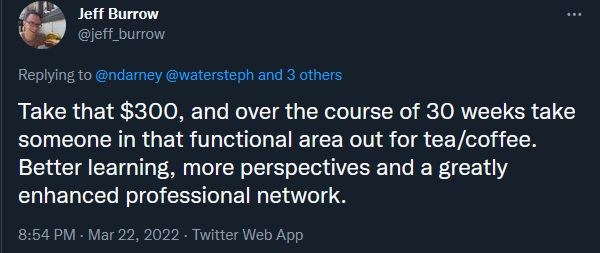
8. This doesn’t solve problems, instead creates them, and ignores real problems
Look, not all SAgrad programs are equal and no grad program exists that covers everything that a SAPro should know. Continuing education IS indeed important…but not this design. Prioritizing certifications will only heighten tensions in SA.
If this is for professionals with 5+ years experience, that group of folks is already jumping out of SA in waves at this point because there simply aren’t enough mid-level jobs to jump into – our field is covered with entry-level roles and positions decrease with each level of advancement. I don’t believe there is really a demand or need for pros of this level to take exams for $375 and beyond.
Over and over again, SAPros say what they need:
- More pay
- Lighter workload / not being overworked
- Treat people with respect
There are other things, of course, but these are the three big things. If NA$PA & Friends really wanted to help their members, they’d support the DOL wage increase and advocate for changes to university systems. They would also, as pointed out by Dra. Michille Espino Lira (@LaProfessora), work with grad programs to improve education instead of corporatizing higher education. Dr. Jason Cottrell also had a great related point, that “We don’t need an association certifying folks.”
9. How is this the priority, when we are 2+ years into a pandemic and higher ed is a hot mess?
Like…I’d ask where your priorities are, but I already know.
10. For all those people criticize those of us critically thinking about this issue…
I love that one SA expat actually tweeted “The responses to this are mind-boggling. We see a group of young professionals who want to be taken more seriously, but who think credentialing is a money grab. I could name dozens of professions where ongoing professional development/credentialing is REQUIRED.”
First, I won’t take seriously any white person who says they are a “guru” of something in their twitter bio (that’s racist, stop). Second, I LOVE that anytime younger professionals critique student affairs, folks who make far too much money think it is cute to minimize their concerns. To think that folks in this field really do think that younger pros should shut up, and enjoy their $35k-$45k and grad student loan payments in THIS economy, and think that further education will suddenly make younger pros respected???? Also…many faculty and upper-level administrators have also been critiquing this!
Conclusion
If we don’t denounce the NA$PA Student Affairs Educators Certifications program, then it will become a Thing. I wholeheartedly believe this will be B.A.D. (Bogus, Aimless, and Dangerous) for the field, increasing disparity instead of actually solving any issues. NA$PA & Friends already created a 501(c)3 for this endeavor and have a whole website, so I don’t think they will cease their efforts. So talk to your colleagues and VPSAs about how this is a B.A.D. idea and an unnecessary use of university funds, and do not use the certifications as criteria for hiring and promotions. (oh jinkies, I am probably going to end up on more SA blacklists after this blog post!)
Bonus Content:
- Great meme by Dan Collier, Ph.D. (@Dcollier74) (I thought I saw another funny meme but can’t find it now…)
- A tweet by Brit M. Williams, Ph.D. (@DrBritWilliams) that made me cackle.
- Some wisdom from Ciera Graham, Ph.D (@CieraGrahamPhD)
*****************************************************
Want to add to the conversation? Tweet me at @NikiMessmore
Tip Jar Information:

Toss a coin to your witcher! LOL that’s me, please keep reading below
Did this information help you? Leave a tip for the hours spent on this essay via one of the following platforms:
| Paypal: | paypal.me/NikiMessmore |
| Venmo: | @Niki-Messmore |
| CashApp: | $NikiMessmore |
Thanks!
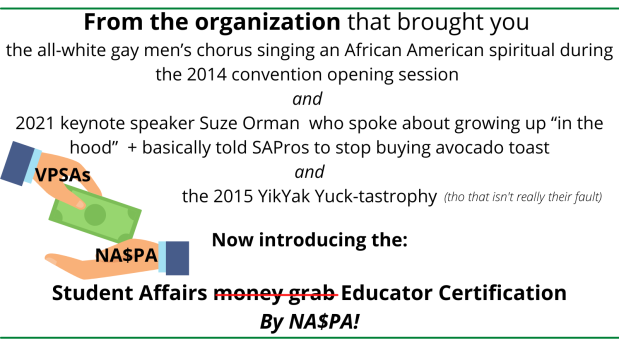
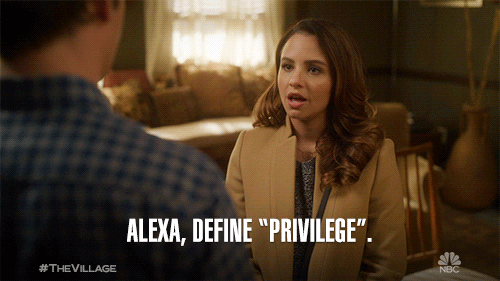


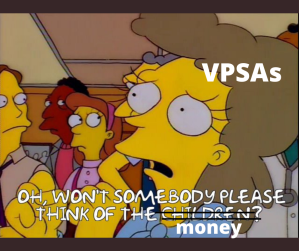

I have a terrific new boss in a really great, new position. Before I took the position I needed to make certain that my President and the institution would be prepared to provide professional development $$$ for my team – a terrific group of younger professionals. My decision to take the new role was partly based on the assurance that there would indeed be such support. I had many mentors who supported me along the way throughout my career to learn, develop and grow. It is my duty to make certain that I do the same. I have got to be honest…I am not a fan of the idea of “certifications.” My team and myself “certify” every single day that we come to work in support and service for our students.. We all know ( much like our teaching colleagues in K-12) that we don’t do this work to earn loads of $$$$. We do this because we love the work, and the opportunity to promote and champion college student success. Things that are most tangible are resources and importance the institution/ leadership place into professional development. I hope NASPA shifts course on this. Certifications? No thanks. Say yes instead to professional development with an emphasis on $$$ resources for travel/conferences and $$$ for talented staff to supplement their costs for graduate programs and trainings. Enough of my ramblings. 🙂
LikeLike
Ask NA$PA what they pay their staff who have master’s degrees and if they’ll raise it to an actual living wage if they get the certification as well 😉
LikeLike
I’m so glad that I left the field…NASPA is truly a joke!
LikeLike